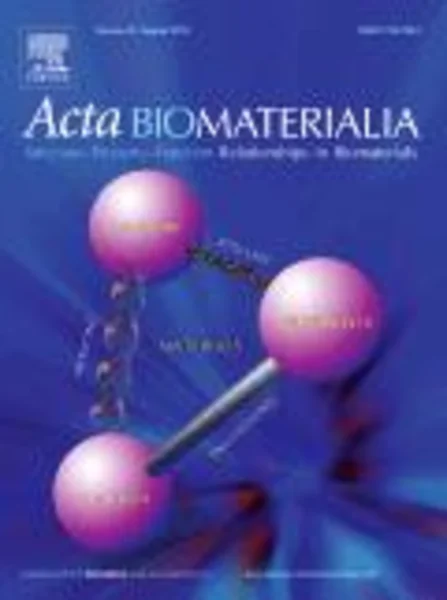-
effect of substrate stiffness on pulmonary fibroblast activation by tgf-β
جزئیات بیشتر مقاله- تاریخ ارائه: 1392/01/01
- تاریخ انتشار در تی پی بین: 1392/01/01
- تعداد بازدید: 622
- تعداد پرسش و پاسخ ها: 0
- شماره تماس دبیرخانه رویداد: -
peptide crosslinkers containing the sequence c-x-cg (x represents various adhesive peptides) were incorporated into poly(ethylene glycol) (peg) hydrogel networks with different mechanical properties. pulmonary fibroblasts (pfs) exhibit increased adhesion to rigid hydrogels modified with x = rgds, dgea and ikvav (0.5 and/or 5 mm) compared with a scrambled control (x = hrpns). pfs exhibit increased adhesion to softer hydrogels when x = dgea at low (0.5 mm) peptide concentration. pfs seeded onto hydrogels modified with x = rgds produce alpha-smooth muscle actin (α-sma), a myofibroblast marker, and form an extensive cytoskeleton with focal adhesions. decreasing substrate stiffness (achieved through hydrolytic degradation) results in down-regulation of α-sma expression by pfs. substrate stiffness increases the sensitivity of pfs to exogenously applied transforming growth factor beta (tgf-β1); pfs on the most rigid gels (e = 900 kpa) express α-sma when treated with low concentrations of tgf-β1 (1 ng ml−1), while those on less rigid gels (e = 20–60 kpa) do not. these results demonstrate the importance of both mechanical and chemical cues in studying pulmonary fibroblast activation, and establish peg hydrogels as a viable material for further study of ipf etiology.
مقالات جدیدترین رویدادها
-
استفاده از تحلیل اهمیت-عملکرد در ارائه الگوی مدیریت خلاقیت سازمانی و ارائه راهکار جهت بهبود
-
بررسی تاثیر ارزش وجوه نقد مازاد بر ساختار سرمایه شرکت های پذیرفته شده در بورس اوراق بهادار تهران
-
بررسی تأثیر سطح افشای ریسک بر قرارداد بدهی شرکت های پذیرفته شده در بورس اوراق بهادار تهران
-
بررسی تأثیر رتبه بندی اعتباری مبتنی بر مدل امتیاز بازار نوظهور بر نقد شوندگی سهام با تأکید بر خصوصی سازی شرکت ها
-
تأثیر آمیخته بازاریابی پوشاک ایرانی بر تصویر ذهنی مشتری پوشاک ایرانی (هاکوپیان)
-
تصویر منصب قضا در آثار شاعران قرن پنجم و ششم هجری
-
تاثیر استفاده از پربیوتیک و پروبیوتیک در جیره غذائی بر عملکرد مرغان تخم گذار، فراسنجه های بیوشیمیایی و فیزیولوژی خون و صفات کیفی تخم مرغ
-
اثر درمانهای پروتز ثابت بر سلامت نسوج پریودنتال
-
آثار "سیطره ی دانش جهانی" در فرآیندهای آموزشی کشور، آسیب ها و راهبردها
-
chitosan/bioactive glass nanoparticle composite membranes for periodontal regeneration
مقالات جدیدترین ژورنال ها
-
مدیریت و بررسی افسردگی دانش آموزان دختر مقطع متوسطه دوم در دروان کرونا در شهرستان دزفول
-
مدیریت و بررسی خرد سیاسی در اندیشه ی فردوسی در ادب ایران
-
واکاوی و مدیریت توصیفی قلمدان(جاکلیدی)ضریح در موزه آستان قدس رضوی
-
بررسی تاثیر خلاقیت، دانش و انگیزه کارکنان بر پیشنهادات نوآورانه کارکنان ( مورد مطالعه: هتل های 3 و 4 ستاره استان کرمان)
-
بررسی تاثیر کیفیت سیستم های اطلاعاتی بر تصمیم گیری موفق در شرکتهای تولیدی استان اصفهان (مورد مطالعه: مدیران شرکتهای تولیدی استان اصفهان)
-
کودک و کودکی از منظر فلسفه و ادبیات
-
بررسی عوامل خودکشی و اقدام به خودکشی دراستان کرمانشاه
-
علل و دلایل خاص ورشکستگی کسب و کارهای کوچک
-
بررسی تأثیر تحصیلات مدیران بر نگهداری وجوه نقد و ارزش مازاد وجوه نقد شرکت های بیمه ای در بورس اوراق بهادار تهران
-
آثار تلف عین مستاجره بر اماکن تجاری




سوال خود را در مورد این مقاله مطرح نمایید :